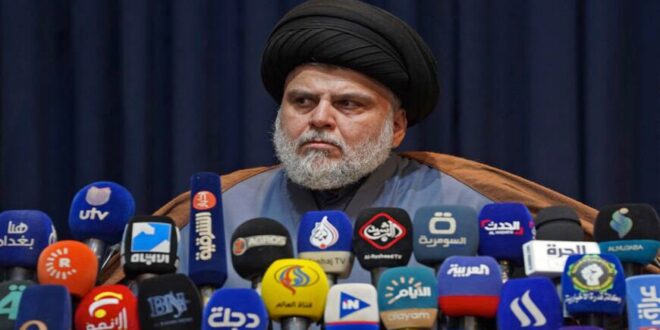Sadr calls for forming majority government as the Iraqi President Barham Salih hosted a meeting with the prime minister and the judiciary head to discuss the current political deadlock and present initiatives for it.
Amidst the political deadlock following Iraq’s elections on Oct. 10, Iraqi President Barham Salih hosted a meeting with Prime Minister Mustafa al-Kadhimi and Chief Justice of the Supreme Judicial Council Faiq Zaidan on Nov. 18 at Baghdad Palace in the Green Zone.
“The attendees discussed an initiative for solving the current political crisis, which will be presented to the political forces in a way that paves the road for forming an effective government serving the people’s interests and protecting the country’s supreme interests,” read a statement from the Iraqi presidency.
Details of the initiative have yet to be announced. But the overall picture of the initiative can be seen from the recent statements of Salih, Kadhimi and Zaidan.
Chief Justice Zaidan confirmed the integrity of the October elections, saying “there is not any legal evidence to prove” they were rigged.
The Independent Electoral Commission has received hundreds of complaints. Only a few have been identified as valid, resulting in a very minor change in the election results.
The process of studying the complaints was double-checked by a judicial team under the supervision of the Judiciary Council, and the final results are expected to be confirmed by the Federal Court next week.
The president and prime minister have also affirmed the necessity of submitting to legal procedures any complaints about the election results.
This is while members of the Popular Mobilization Units (PMU) and some of their sympathizers block one gate to the Green Zone and also gathered in the front of another gate that leads to most of the government buildings and foreign embassies. The protesters demand elections results be nullified and a new election be held with a new electoral commission.
Protests have turned violent, so far resulting in two dead and over 150 wounded. The majority of the wounded are security forces who were attacked by protesters with stones, wood and other objects.
A drone attack on the prime minister’s house occurred as part of pressure on the government to submit to the protesters’ demands. Instead, the attack boosted support for the government, the prime minister and even for the election results — which were praised by the United Nations and also the Security Council.
In response to protests against the election results, Sadrist movement head Muqtada al-Sadr, who won the highest number of seats in the elections, confirmed in a press conference Oct. 18 that he is willing to form a majority government.
Sadr met two weeks ago with parliament speaker Mohammed al-Halbusi, who gained the majority of Sunni votes and 34 seats, and also a delegation of the Kurdistan Democratic Party, which gained the majority of Kurdish votes and 37 seats.
The final results have not been announced officially as it requires the approval of the federal court. So, the above number might be changed very slightly.
The meeting was read as an intention to form a coalition for the next government, meaning that the political wings of the PMU and their allies will be out of the government.
Sadr’s meeting with Halbusi and the Kurdistan Democratic Party delegation led to the violence by the protesters, as they saw it as an attempt to form a majority government and remove the PMU and its allies from the new government.
It seems that Sadr now is trying to confront his political rivals with the political reality, confirming that he is not willing to give up or show any tolerance toward them.
“All have witnessed the integrity of the recent elections,” Sadr said in his press conference. “We seek to form a government of a national majority.”
Sadr also tried to put the ball in his rival’s court, calling for the disarmament of militias outside of the PMU.
“I call for the liquidation of the PMU’s undisciplined elements,” he said. “All armed factions must be dissolved and disarmed at once — their arms to be handed over to the PMF supervised by the commander in chief [of the military forces (Kadhimi)].”
Sadr’s statement strongly shook the political scene, as the political wings of the PMU and their allies, who formed the Coordination Framework after the elections, are calling for an immediate meeting on the evening of Nov. 18 at the home of Hikma bloc leader Sayyed Ammar Hakim to discuss a response to Sadr’s press conference.
It seems that moving forward with a majority government, as Sadr wants, will be very difficult in this environment, and the next government will most likely be a consensus government, like all previous governments after 2003.
 Eurasia Press & News
Eurasia Press & News



